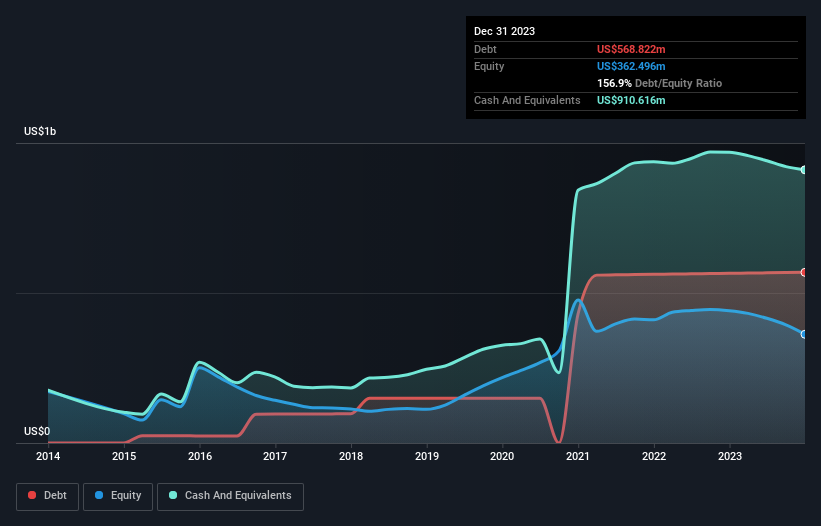- United States
- /
- Medical Equipment
- /
- NasdaqGS:NVCR
NovoCure (NASDAQ:NVCR) Has Debt But No Earnings; Should You Worry?

The external fund manager backed by Berkshire Hathaway's Charlie Munger, Li Lu, makes no bones about it when he says 'The biggest investment risk is not the volatility of prices, but whether you will suffer a permanent loss of capital.' So it might be obvious that you need to consider debt, when you think about how risky any given stock is, because too much debt can sink a company. We can see that NovoCure Limited (NASDAQ:NVCR) does use debt in its business. But should shareholders be worried about its use of debt?
What Risk Does Debt Bring?
Debt is a tool to help businesses grow, but if a business is incapable of paying off its lenders, then it exists at their mercy. If things get really bad, the lenders can take control of the business. While that is not too common, we often do see indebted companies permanently diluting shareholders because lenders force them to raise capital at a distressed price. Of course, debt can be an important tool in businesses, particularly capital heavy businesses. When we examine debt levels, we first consider both cash and debt levels, together.
See our latest analysis for NovoCure
What Is NovoCure's Net Debt?
As you can see below, NovoCure had US$568.8m of debt, at December 2023, which is about the same as the year before. You can click the chart for greater detail. However, it does have US$910.6m in cash offsetting this, leading to net cash of US$341.8m.

How Strong Is NovoCure's Balance Sheet?
The latest balance sheet data shows that NovoCure had liabilities of US$179.1m due within a year, and liabilities of US$604.5m falling due after that. On the other hand, it had cash of US$910.6m and US$66.5m worth of receivables due within a year. So it actually has US$193.5m more liquid assets than total liabilities.
This short term liquidity is a sign that NovoCure could probably pay off its debt with ease, as its balance sheet is far from stretched. Succinctly put, NovoCure boasts net cash, so it's fair to say it does not have a heavy debt load! There's no doubt that we learn most about debt from the balance sheet. But it is future earnings, more than anything, that will determine NovoCure's ability to maintain a healthy balance sheet going forward. So if you're focused on the future you can check out this free report showing analyst profit forecasts.
In the last year NovoCure had a loss before interest and tax, and actually shrunk its revenue by 5.3%, to US$509m. That's not what we would hope to see.
So How Risky Is NovoCure?
Statistically speaking companies that lose money are riskier than those that make money. And in the last year NovoCure had an earnings before interest and tax (EBIT) loss, truth be told. And over the same period it saw negative free cash outflow of US$100m and booked a US$207m accounting loss. But the saving grace is the US$341.8m on the balance sheet. That means it could keep spending at its current rate for more than two years. Overall, its balance sheet doesn't seem overly risky, at the moment, but we're always cautious until we see the positive free cash flow. When analysing debt levels, the balance sheet is the obvious place to start. But ultimately, every company can contain risks that exist outside of the balance sheet. For example, we've discovered 2 warning signs for NovoCure that you should be aware of before investing here.
Of course, if you're the type of investor who prefers buying stocks without the burden of debt, then don't hesitate to discover our exclusive list of net cash growth stocks, today.
If you're looking to trade NovoCure, open an account with the lowest-cost platform trusted by professionals, Interactive Brokers.
With clients in over 200 countries and territories, and access to 160 markets, IBKR lets you trade stocks, options, futures, forex, bonds and funds from a single integrated account.
Enjoy no hidden fees, no account minimums, and FX conversion rates as low as 0.03%, far better than what most brokers offer.
Sponsored ContentValuation is complex, but we're here to simplify it.
Discover if NovoCure might be undervalued or overvalued with our detailed analysis, featuring fair value estimates, potential risks, dividends, insider trades, and its financial condition.
Access Free AnalysisHave feedback on this article? Concerned about the content? Get in touch with us directly. Alternatively, email editorial-team (at) simplywallst.com.
This article by Simply Wall St is general in nature. We provide commentary based on historical data and analyst forecasts only using an unbiased methodology and our articles are not intended to be financial advice. It does not constitute a recommendation to buy or sell any stock, and does not take account of your objectives, or your financial situation. We aim to bring you long-term focused analysis driven by fundamental data. Note that our analysis may not factor in the latest price-sensitive company announcements or qualitative material. Simply Wall St has no position in any stocks mentioned.
About NasdaqGS:NVCR
NovoCure
An oncology company, engages in the development, manufacture, and commercialization of tumor treating fields (TTFields) devices for the treatment of solid tumor cancers in the United States, Germany, France, Japan, Greater China, and internationally.
Undervalued with adequate balance sheet.
Market Insights
Community Narratives



